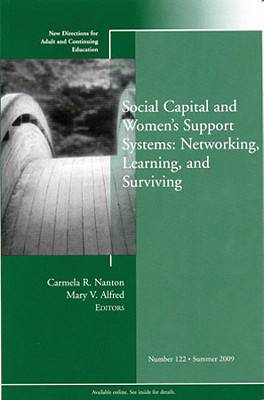
Bedankt voor het vertrouwen het afgelopen jaar! Om jou te bedanken bieden we GRATIS verzending (in België) aan op alles gedurende de hele maand januari.
- Afhalen na 1 uur in een winkel met voorraad
- In januari gratis thuislevering in België
- Ruim aanbod met 7 miljoen producten
Bedankt voor het vertrouwen het afgelopen jaar! Om jou te bedanken bieden we GRATIS verzending (in België) aan op alles gedurende de hele maand januari.
- Afhalen na 1 uur in een winkel met voorraad
- In januari gratis thuislevering in België
- Ruim aanbod met 7 miljoen producten
Zoeken
Social Capital and Women's Support Systems: Networking, Learning, and Surviving
New Directions for Adult and Continuing Education, Number 122
€ 30,95
+ 61 punten
Omschrijving
The concept of social capital goes back to the early twentieth century. Although it has sociological underpinnings, it has been primarily applied in the business arena.
Specificaties
Betrokkenen
- Uitgeverij:
Inhoud
- Aantal bladzijden:
- 104
- Reeks:
Eigenschappen
- Productcode (EAN):
- 9780470537343
- Verschijningsdatum:
- 25/06/2009
- Uitvoering:
- Paperback
- Afmetingen:
- 151 mm x 228 mm
- Gewicht:
- 168 g

Alleen bij Standaard Boekhandel
+ 61 punten op je klantenkaart van Standaard Boekhandel
Beoordelingen
We publiceren alleen reviews die voldoen aan de voorwaarden voor reviews. Bekijk onze voorwaarden voor reviews.








